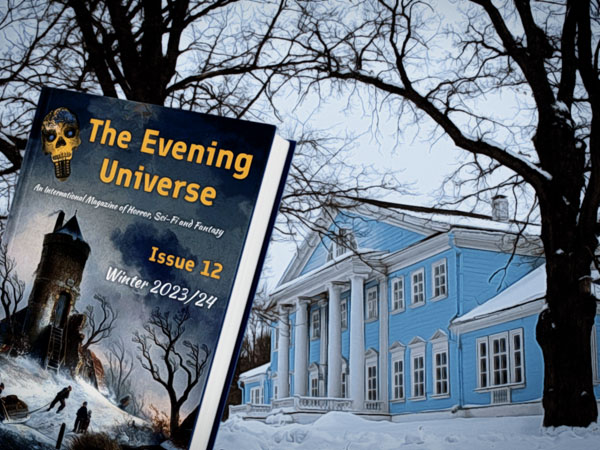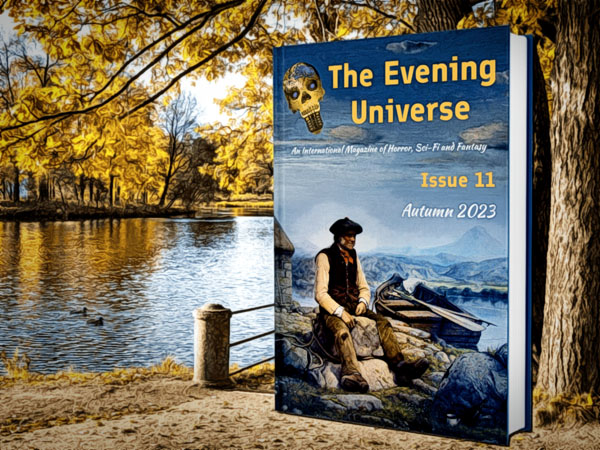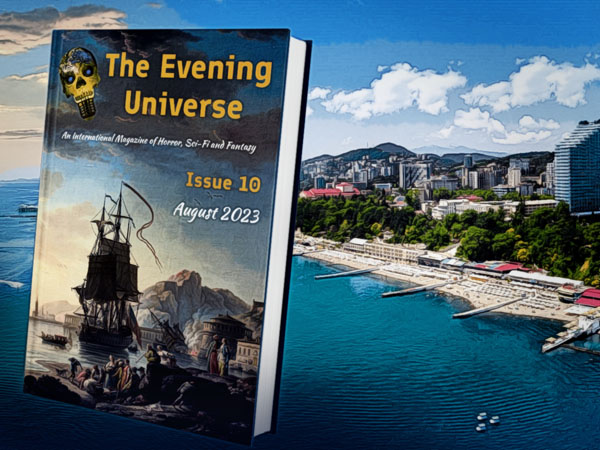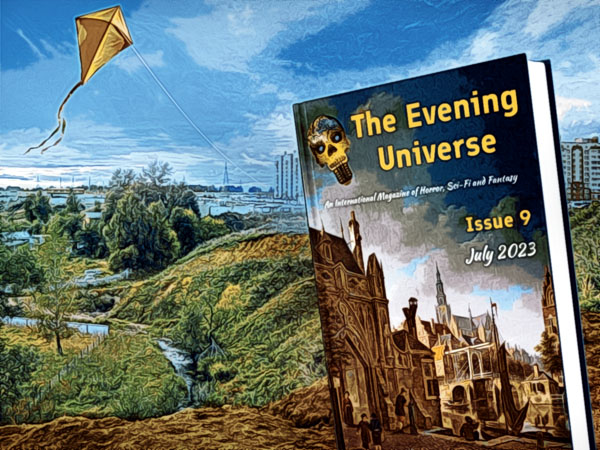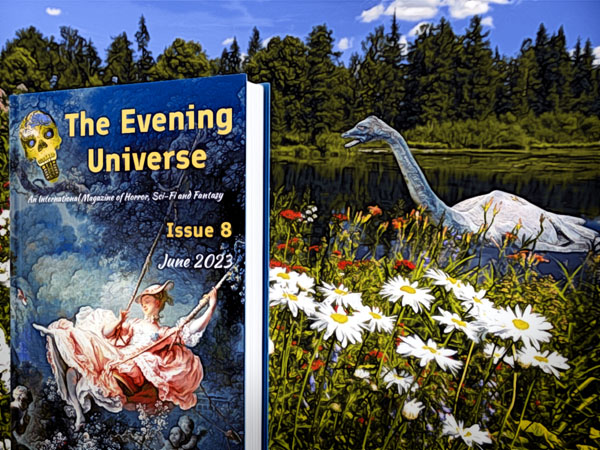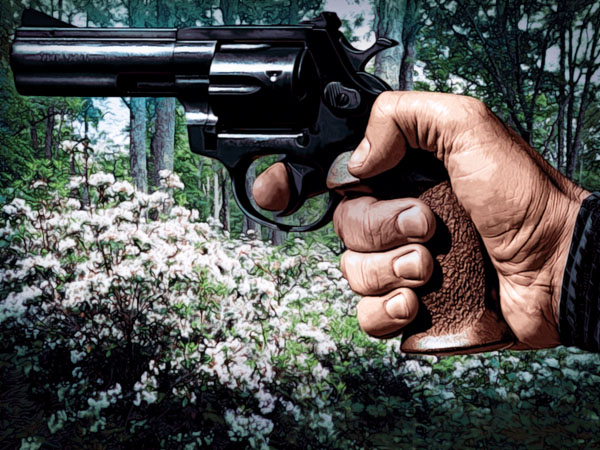
In a once-logged forest in the northern reaches of the Blue Ridge a mountain laurel colony thrives across measureless acres. The stronghold’s every molecule is poisonous; its interlocked thickets form a little hell for any who attempt passage. When the laurel blooms in early summer its wool of hexagonal flowers, each one perfect with a hypnotic symmetry, dyes the woods a beguiling white. For more than a century fire has chastened the laurel, pests have plagued it, but still it has grown, and grown, and expanded its domain.
With every season its woody brain of roots complexifies, each dirt-bound strand pulsing with information in a dendritic, sentient galaxy. So that the laurel with its snake-tongue stamens eventually starts to evaluate the warm-blooded things that chance into its embrace. And like starlings in a murmuration or villagers in a mob, the hive reacts and deliberates with one mind, levying a judgment on the entrant and their fate.
On a grey, humid morning, two gunshots fracture the air. Legs gallop into the laurel’s woods. The hive turns its billion blossom eyes to the west.
The man barrels through the fern sea. A dark trail of snapped fronds sags in his wake. His mouth froths as he hurtles between the colossal trees rising from the green swell. His right hand strangles the handle of a snub-nosed revolver, his index finger glued to the trigger. Four of the six chambers are empty. He rasps as he ignores the fire in his thighs and impels himself deeper into the greening woods.
When his lungs begin to falter he slows to a stagger. Then a drag. He lunges to the closest trunk and shimmies to its front, placing the tree between himself and his origin. He puts his back against the grain; raises his chin; closes his eyes; seals his mouth. Spent air blasts from his nostrils.
The man listens.
Silence.
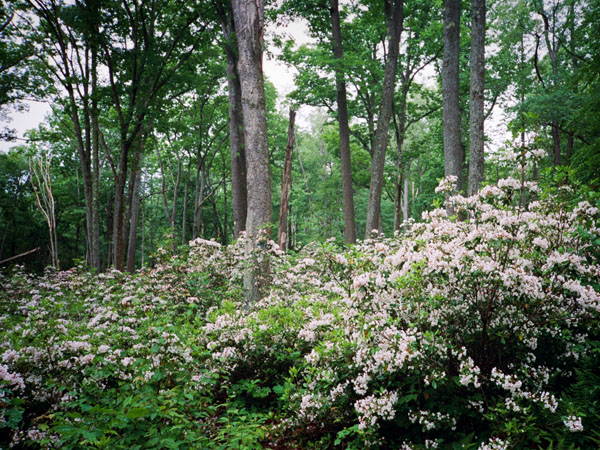
The real place the story is inspired by. Photo by the author
He turns his head and inches an eye past the tree. The crazed pupil scours the forest, darting from trunk to trunk. It searches for blue police uniforms, for the steeples of state trooper hats. But the man finds none. The only human trace is his long, erratic depression plowed through the understory. It documents his movements down to the stride.
“Shit,” he spits the pent-up breath from his mouth. He whacks the butt of the revolver twice against his temple and grits his yellow teeth as he stares at the map he has left his pursuers.
He straightens his back against the tree and looks up. The quilted canopy flutters. Rain scents the rising wind. The man jerks his gaze down. The landscape pulsates with a verdancy that overwhelms his vision. He rubs the tears of exertion from his eyes, the spittle from his mouth, and blinks rapidly. The knives in his chest and legs begin to fade.
The man squints. His head lolls forward. Far off ahead of him, a horizontal stripe of cherubic white disrupts the green-spread. It threads across the horizon, shimmering like the farthest water seen from shore.
Wind rushes high in the canopy. Its sounding flume thwarts his vigilance. His eyes shoot up and then over his shoulder. The woodland lilts and melds isolated movements into one pastiche.
He thinks he detects the spinning of rotors overhead. He stabs the handgun into the air, swinging it wildly from point to point, hunting a helicopter through the branches.
The wind muffles his curses. The man snaps his head down and shoots forward into the curling green waves.
* * *
The man’s broken trail stretches back through the woods. At the treeline crimson bootprints reverse out onto a quiet road lined by mobile homes. The tracks backpedal through a swarm of patrol cars and flashing lights to a faded white trailer. In the driveway, beside a vintage yellow Thunderbird strewn with tools, lies an old man stiffening under a police sheet to cover his near nudity. A dirty sweatshirt and jeans, too small for him, lay discarded by the car’s bumper. His embossed leather holster is empty and flung to his side. Two bullets from its missing tenant are buried in his torso. Nearer to the woods a policewoman sprawls with her pistol death-gripped in her right hand, her collarbone and sternum shattered. Beside her shrouded body a contingent of cops and dogs prepares to enter the woods.
* * *
The man clutches the waist of the old man’s pants as he runs. The overall straps flail at his hips like tentacles. Sweat drenches his hair and the stolen red and brown flannel.
He trips on an errant root and pitches forward. His hands strike the ground first. The revolver fires, detonating in his ears. The explosion resounds through the woods.
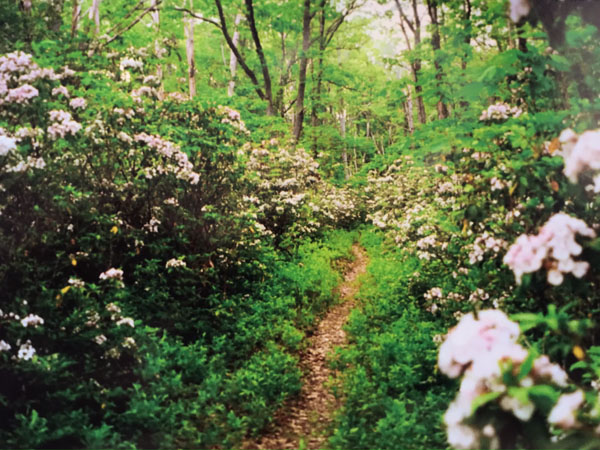
The real place the story is inspired by. Photo by the author
He scrabbles in the ferns and flips onto his back. His hands accost his torso in search of a wound. He pushes himself up to a seated position and aims the revolver back the way he came. His eyes slit with desperate rage.
Still the green pearl of the forest swims with wind, discernment impossible.
The ringing from the shot splits his head. His jaw opens and shuts as though he chews something too big for his mouth.
“Now they have a gunshot to follow,” he snarls. “Probably think I killed a hiker.” He jabs his booted feet into the mess of ferns and dirt. “Why did that old goddamn joe talk back? Couldn’t just give me his clothes, had to go for his gun.” He rolls onto his stomach and looks ahead. “And that cop, why’d she have to—”
His mouth freezes.
The pink-and-white fortress of mountain laurel towers into the air several strides ahead of him.
The wind dies out. A viscous silence drapes over the woods. Somewhere deep in the trees a thrush twinkles its delicate god-song like the synchronous breaking of a thousand, minute glass worlds. Fragrance plumes from the edifice of flower sprays. It blinds with a brilliance that seems to radiate from some internal force.
The laurel’s scale and abundance send a shudder through the man that seals his gawking jaw. He rubs his eyes and shakes his head. A shower of sweat pelts the ferns. He rises slowly, watching the pastel hedge with suspicion.
The man steps back and looks down the wall. The coral boundary marches in either direction as far as he can see. It bisects the forest into what he has seen, and what awaits him.
His pupils slide to their left.
“Bastard.”
He twirls around with the revolver primed. Every leaf ogles him. The thrush flutes and a madrigal of bees hums from the laurel behind him.
A dog barks in the distance. His hackles rocket up.
He turns and glowers at the long, seductive barrier. An odd fear whimpers in the corners of his eyes.
“Screw it.”
He dashes for the narrow opening of a deer run to his left and stoops to enter the maze.
* * *
The man shuffles through the game tunnel crimped at the middle like an open clam shell. The enclosure is dark, the air stagnant with perfume and sunlight-starved dirt. Blooms encircle his bent head and limbs. Their long stamen tongues taste him. Signals flow to the root-brain.
He emerges from the tunnel onto the compacted brown clay of an old service road. The trail bends sharply in either direction in a horseshoe. Fugitive flowers stick to his sweat-slicked head; errant petals and floral viscera crawl down his back and latch onto his skin like leeches. He ruffles the flannel to dislodge them as he jogs around the north bend of the road.
The mountain laurel grows clear across the cut. The shrubs spool from the roadsides, edging out into the break.
The man sneers at the blocked path and spins. He sprints around the horseshoe’s middle. At the opposite end he finds the same sight.
The sweat stings his eyes and he blinks in bewilderment at the barrier. His heart and breath struggle in ragged cacophony. He looks up. Every green granule studies him in petrified silence. The hot grey sky crushes the crowns of the trees.
A clamp tightens over his sternum. He drops his eyes to the wayward stretch of road. The laurel seems to have encroached further on the break.
“What in the hell…”
His voice sounds alien to him. Each syllable floats out and hangs in the air, confined.
The man vaults back to the deer run. The sprays grow over the gap as though it was never there. The thrush’s incantation haunts from all sides, splintering glass in his ear drums.
He beats the side of his head with his palm.
“Relax, relax! Don’t lose it now.”
The man mops the sweat from his face with the sleeve of the tattered flannel. He takes off down the road’s left segment. He lowers his head and crashes through the blooming thicket. He claws the branches apart, stepping high and stomping down to clear a path. At first he struggles, the tangles holding firm, but as he flings himself forward the branches curl away at his push. The flowers pour onto him by the thousands as though from a deep, bountiful wound, enveloping him in their hemorrhage.
Something cracks and bursts beneath his boot. The man jolts to a stop and looks down. He raises his foot from a woven nest. A clutch of eggs lies obliterated, the goo dripping from his sole. Their fragile annihilation summons the faces of the old man and the officer: The deathly grimaces that contorted their mouths with unimaginable pain when the close-range shot pulverized their flesh, snapped their bones. Pawing at the wounds as they fell like their doom could be swatted away.
The man smacks his forehead to banish their images.
“Dumb bird building a nest on the ground!” he yowls and jerks the dying slime of cells from his boot.
He looks back and the mountain laurel has twined together, effacing the path he blazed.
He limps forward. Again the branches forsake their turgidity for him. He peels them back with the barrel of the revolver. His face and hair wear a lacquer of petals.
Something feathered breezes against his calf. He keeps moving, blaming a branch.
It strafes his leg again.
The man wheels around and stares into the dark mire. The mouth of the revolver tracks his leer.
An avian shriek peals from beside his head. The man lurches into the brush as though the noise has shoved him and pulls the revolver’s trigger in the bird’s direction. The gun clicks, the hammer uncocked. He thrashes to regain his balance and pulls against tendrils that have coiled around his ankles and wrists. When he tugs himself free he spits up petals that have infested his throat and lungs.
He tears through the scrum, all the while the tangle closing behind him. The shrieks multiply, bombarding him from every side. Birds he does not look up to see throw themselves against his scalp, peck tithes of his flesh, screech with a mania that rings with the awful cries of those he killed.
The man staggers out into a clearing. The flannel and pants hang off him in rags. Lacerations tattoo his flower-strewn skin. The grey sky presses on him with the intensity of the desert sun; the white glare from the ocean of flowers cleaves his forehead.
He heaves short breaths from an airway choked with petals. His knees wobble. He squints at the clearing. The compacted dirt, the horseshoe bend, it is all the same. Only, the laurel has engulfed more of the curve. In the hedges the legion of birds screams, the million bees vibrate, the forked tongues of the flowers strain to devour him.
“Where…how…”
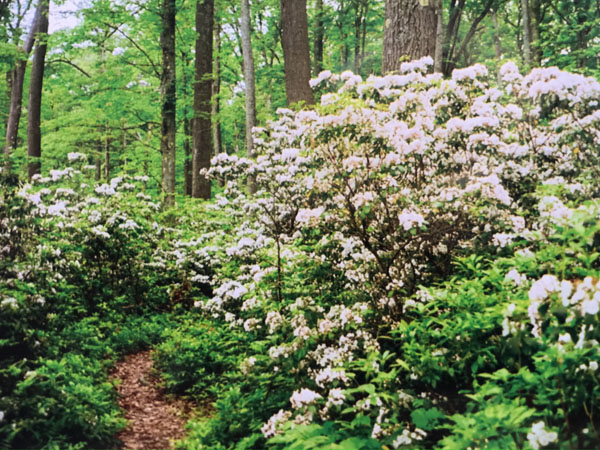
The real place the story is inspired by. Photo by the author
His vision blurs. He only sees swathes of seashell pink, molten green, asphyxiating grey. He stumbles in delirium, the revolver and its one filled chamber still clutched in his hand. The vengeful chorus rises to a decibel that ruptures his eardrums as he falls forward into the waiting hedge. In the tumble of his arms the hammer cocks and the trigger clicks. The din muffles the shot. Then, like hands pressed over ears, the hellish symphony quiets.
Far off, somewhere unknowably remote, a thrush harps. The man lies on his back, a hole ripped in his stomach by the revolver shell. As his life ebbs out the laurel entombs him, consumes the clearing, its verdict rendered on the guilty and cruel.

